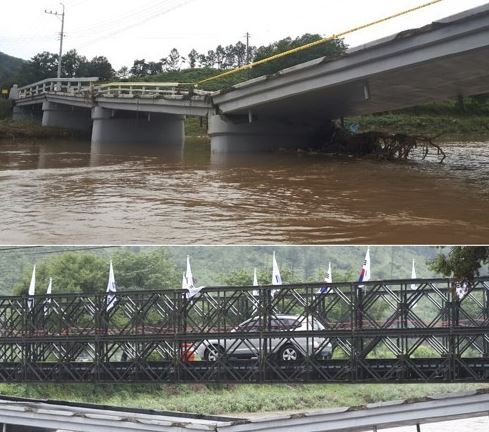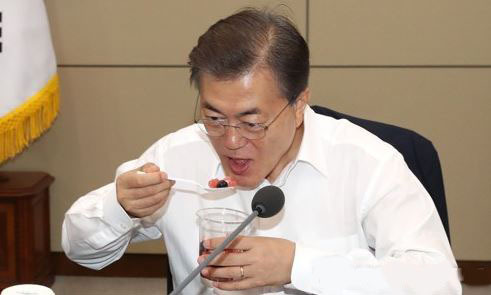President Moon Jae-in said Thursday that he has declared three areas recently hit by torrential rain disaster areas, enabling special government support for the regions.
"I approved the request to declare the three areas special disaster areas. I hope this will help those regions in their recovery. I wish to once again offer my sincere consolation to the people in the regions," the president said while meeting with his top presidential secretaries in a weekly meeting held at the presidential office, Cheong Wa Dae.
The three regions are Cheongju, Cheonan and Goesan, all located in the central Chungcheong provinces that were recently hit by heavy rains.
 |
(Yonhap) |
Cheongju alone reported 57.3 billion won ($51.5 million) in damage.
As a special disaster area, the city with a population of some 830,000 and its people are now entitled to a wide range of government support, including a large support fund.
However, some in the vicinity that are dealing with damage from the flood may not be able to benefit from such support should their homes be located outside of the administrative boundary of the areas declared a special zone, Moon noted.
The president called for a revision of the law on government support for disaster areas to allow support for even a handful of people affected by a disaster even though the rest of their administrative town may remain intact, according to Cheong Wa Dae pool reports.
His secretaries also noted the need to allow special support for residents who live in apartment buildings, noting the law currently only allows support for damage incurred on detached houses.
 |
President Moon Jae-in tastes fruits from flood-hit areas while meeting with his senior secretaries at Cheong Wa Dae in Seoul on July 27, 2017. (Yonhap) |
Later, Cheong Wa Dae spokesman Park Soo-hyn said the president has ordered Cheong Wa Dae to take charge of dealing with major accidents or disasters.
"There have been claims that Cheong Wa Dae is not the control tower, but there is no way we can say Cheong Wa Dae is not the control tower in case of a serious disaster," the president was quoted as saying, apparently referring to such claims by the former administration.
The ousted former president, Park Geun-hye, and her administration had made such a claim while arguing they cannot or must not be held responsible for the tragic sinking of the Sewol ferry in 2014 or the death of more than 300 passengers then.
From now, the president said the government, under the leadership of the prime minister, will be responsible for dealing with all major accidents and disasters, and that the presidential office will take charge when such accidents or disasters exceed certain limits in scale and scope to be decided, according to the Cheong Wa Dae spokesman.
The president also stressed the need to ensure what he called complete authority of officials and rescue workers dealing with accidents or disasters on-site, apparently noting critical decisions may often have to be made in a matter of seconds in such conditions.
To this end, the president said the recently reestablished Korea Coast Guard must have such complete authority in dealing with events taking place out on the sea while the fire department will have the same authority in events on land.
Also, noting the maritime police may need some time to get used to its newly reinstated operations, the president ordered Cheong Wa Dae to set up a special task force to handle major events or disasters that may take place during the summer, Park said.
The Korea Coast Guard was reestablished earlier this week, nearly three years after it was placed under the leadership of the now-defunct public safety and security ministry in the aftermath of the 2014 ferry sinking. (Yonhap)









![[Today’s K-pop] Blackpink’s Jennie, Lisa invited to Coachella as solo acts](http://res.heraldm.com/phpwas/restmb_idxmake.php?idx=644&simg=/content/image/2024/11/21/20241121050099_0.jpg)